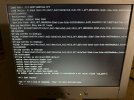Hello. I have an x86-64 machine running FreeBSD 13.3-RELEASE that I want to upgrade to 14.1-RELEASE. After running
I have attached the full error message.
freebsd-update upgrade -r 14.1-RELEASE and freebsd-upgrade install, I rebooted my machine, only to encounter the error "Startup error in /boot/lua/loader.lua: LUA ERROR: /boot/lua/core.lua:68: attempt to concatenate a nil value (field 'lua_path'). I am able to boot in FreeBSD by typing boot /boot/kernel.old, but I don't know how to proceed with installing 14.1-RELEASE.I have attached the full error message.


